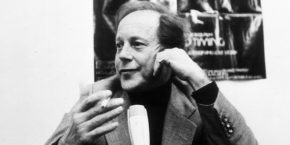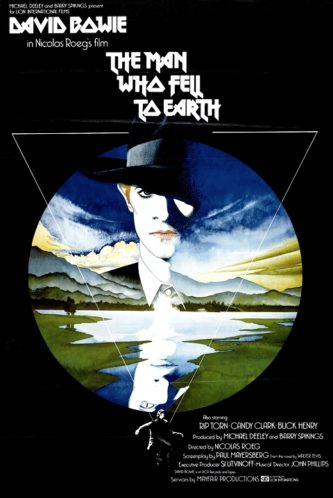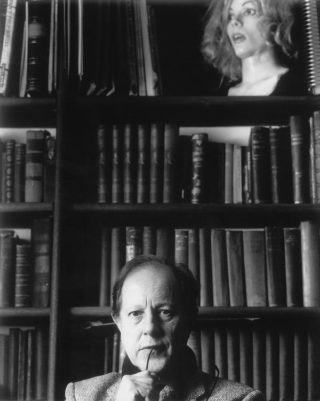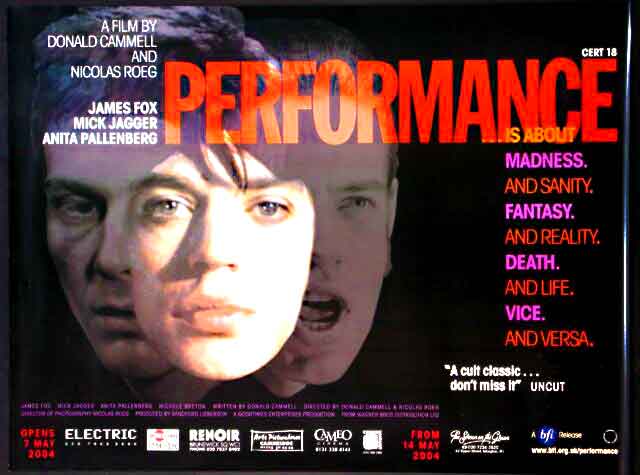 On November 23, 2018 we lost one of the world’s greatest filmmakers. The British director Nicolas Roeg was a fearless experimenter, provocateur, jester and all-around expert technician (and was furthermore said to have led quite an eventful personal life involving copious amounts of sex, drugs and alcohol). There was no other filmmaker even remotely like him, and none, I assert, who will ever be capable of taking his place.
On November 23, 2018 we lost one of the world’s greatest filmmakers. The British director Nicolas Roeg was a fearless experimenter, provocateur, jester and all-around expert technician (and was furthermore said to have led quite an eventful personal life involving copious amounts of sex, drugs and alcohol). There was no other filmmaker even remotely like him, and none, I assert, who will ever be capable of taking his place.
There was no other filmmaker even remotely like him, and none, I assert, who will ever be capable of taking his place.
It’s been said that Roeg’s films “defined” the 1970s. It’s certainly true that Roeg’s most fertile period occurred in that decade, and that he did much to establish the particulars of seventies chic, but the fact is that he helped define the sixties, seventies, eighties and (to a much lesser degree) nineties. It was in the sixties that Roeg worked as a cinematographer on iconic films ranging from FAHRENHEIT 451 to PETULIA and THE MASQUE OF THE RED DEATH before coming into his own as an especially individualistic filmmaker in the following three decades. Visual brilliance and stylistic innovation were among Roeg’s trademarks, along with a unique storytelling ingenuity; quite simply, nobody could redefine a genre like Nicolas Roeg.
 Another Roeg quality that mustn’t go unmentioned here is his fearlessness. He wasn’t afraid to look stupid, as evinced by those innumerable moments that even in his best films are questionable, if not outright ridiculous. An example would be a sex scene in the middle of THE MAN WHO FELL TO EARTH (1976) (trailer below) that’s suddenly interrupted by a shot of the naked participants lying motionless and staring into the camera, a moment that’s stupid by any standard; even more so is the opening shot of EUREKA (1983), a non-science fiction drama about love and avarice that commences with an establishing shot of the planet Earth (I guess Roeg was concerned we’d think it was set on some other planet?), and also a scene near the end of PERFORMANCE (1970) in which, presumably to illustrate the Borgesian nature of the proceedings, a photograph of Jorge Luis Borges is briefly flashed onscreen.
Another Roeg quality that mustn’t go unmentioned here is his fearlessness. He wasn’t afraid to look stupid, as evinced by those innumerable moments that even in his best films are questionable, if not outright ridiculous. An example would be a sex scene in the middle of THE MAN WHO FELL TO EARTH (1976) (trailer below) that’s suddenly interrupted by a shot of the naked participants lying motionless and staring into the camera, a moment that’s stupid by any standard; even more so is the opening shot of EUREKA (1983), a non-science fiction drama about love and avarice that commences with an establishing shot of the planet Earth (I guess Roeg was concerned we’d think it was set on some other planet?), and also a scene near the end of PERFORMANCE (1970) in which, presumably to illustrate the Borgesian nature of the proceedings, a photograph of Jorge Luis Borges is briefly flashed onscreen.
He wasn’t afraid to look stupid, as evinced by those innumerable moments that even in his best films are questionable, if not outright ridiculous.
Such goofiness abounds in Roeg’s filmography, which doesn’t suffer from it. Quite the opposite, in fact; as with all truly cool people and objects, Roeg’s films clearly don’t care if they look silly, nor even if you like them. That of course is in direct contrast to most Hollywood productions, which have a puppy dog-like eagerness to be loved, whereas Roeg’s films demanded to be met on their own terms and made no apologies for it.
Choosing a favorite Roeg film is no easy task. For me that impossible designation is between PERFORMANCE (trailer below), DON’T LOOK NOW (1973) and THE MAN WHO FELL TO EARTH. PERFORMANCE, a wild, scattershot and quintessentially late-1960s take on gangster cinema, was Roeg’s directorial debut, and provided an excellent distillation of the brilliance and innovation that would come to define his filmography (although according to most accounts I’ve read the true auteur of PERFORMANCE was its writer and co-director Donald Cammell). DON’T LOOK NOW provided one of Roeg’s most startling takes on time and prophecy, two of his most oft-utilized themes (and also contained what is undoubtedly the greatest non-pornographic sex scene in movie history), whereas in THE MAN WHO FELL TO EARTH Roeg transformed Walter Tevis’ tight and controlled source novel into an impossibly scatterbrained yet endlessly fascinating and multi-layered piece of cinema that registers as one of the decade’s most vital excursions in science fiction.
Other standout Roeg movies include WALKABOUT (1971), an ersatz kids’ movie set in the Australian outback that may well be the single most evocative depiction of that region ever put on film; BAD TIMING (1980), a profoundly bleak, explicit and typically innovative portrayal of sexual obsession that makes BASIC INSTINCT look like the shallow waffle it is; INSIGNIFICANCE (1985), a 1950s set reverie that incorporates Albert Einstein, Marilyn Monroe and a hallucinogenic nuclear holocaust; and THE WITCHES (1990), which despite a severely misguided ending is a terrifically unnerving adaptation of the similarly titled Roald Dahl book.
I’ll also have to give nods to EUREKA and TRACK 29 (1988), which aren’t great by any means but do qualify as solid guilty pleasures. The former film justifies the non-ironic comparison made by author Joseph Lanza (in his indispensable 1989 Roeg study FRACTURED GEOMETRY) between Roeg and Ed Wood—as apparently “No other two directors have so ingeniously mastered the art of ambivalent intention by refusing to reveal whether we are really laughing at them or they at us”—while the very BLUE VELVET-esque latter film represents the one and only collaboration between Roeg and fellow British provocateur Dennis Potter, for which reason it’s a must watch (Roeg, incidentally, was initially slated to direct the 1989 Potter scripted miniseries BLACKEYES, which the author, unfortunately enough, ended up helming himself).
I’ll also have to give nods to EUREKA and TRACK 29 (1988), which aren’t great by any means but do qualify as solid guilty pleasures.
There’s also CASTAWAY (1996), a middling island set sex drama that can be viewed as the point when Roeg’s work began going downhill  artistically. That slide continued with the uninspiring features COLD HEAVEN (1992), TWO DEATHS (1994) and PUFFBALL (2007), and the TV movies SWEET BIRD OF YOUTH (1989), HEART OF DARKNESS (1993), FULL BODY MASSAGE (1995) and SAMSON AND DELILAH (1996).
artistically. That slide continued with the uninspiring features COLD HEAVEN (1992), TWO DEATHS (1994) and PUFFBALL (2007), and the TV movies SWEET BIRD OF YOUTH (1989), HEART OF DARKNESS (1993), FULL BODY MASSAGE (1995) and SAMSON AND DELILAH (1996).
It seems that after nearly four decades working in the film industry Roeg may have burned himself out, although the problem could also have been that, as Quentin Tarantino once pointed out, “if all you do is these little art films for 10 years for a million or two dollars, you’re going to climb up your own ass. When was the last time Nicolas Roeg did a good movie?” Even the greatest artists can’t keep up their hot streaks forever, and Nicolas Roeg, I feel, fully deserves to be classified as a great artist.

